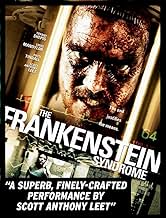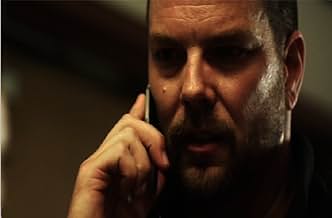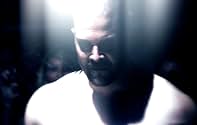NOTE IMDb
4,8/10
1,1 k
MA NOTE
Ajouter une intrigue dans votre langueA group of researchers conducting illegal stem cell research discover a cell anomaly that has the potential to regenerate dead tissue. Unable to conduct legal human trials, the researchers t... Tout lireA group of researchers conducting illegal stem cell research discover a cell anomaly that has the potential to regenerate dead tissue. Unable to conduct legal human trials, the researchers turn to corpses to test their serum.A group of researchers conducting illegal stem cell research discover a cell anomaly that has the potential to regenerate dead tissue. Unable to conduct legal human trials, the researchers turn to corpses to test their serum.
- Réalisation
- Scénario
- Casting principal
- Récompenses
- 2 victoires au total
R.K. Anderson
- Marquez
- (as Richard Anderson)
Avis à la une
This a Frankenstein remake. Frankenstein is on of the greatest horror stories ever and they ruined it. This movie is badly acted. Badly written. It has an awful ending. In this one the monster can turn water into fruit punch. I don't mind that Dr Frankenstein is woman. The part about the monster turning water into fruit punch I could of do mind. This movie is not scary at all. I can think of some very scary Frankenstein movie. Frankenstein (1931) is very scary. The cures of Frankenstein is very scary. Frankenstein unbound is also very scary. I Frankenstein is also very scary. But not this one don't see it. Don't wast your money. And don't wast you time.
This movie is a bit scientifically ignorant, which might offend some people who are hoping for a science fiction story, and the philosophical / ethical questions are rather simplistic, but it's still enjoyable for what it is (a mad scientist movie, in the Frankenstein tradition). Basically, a group of ethically challenged researchers decide that they're going to muck around with illegal stem cell research. When things go wrong and bodies start to pile up, a unique opportunity presents itself, Herbert West-style: re-animating the cadavers of troublemakers who got in the way. Unfortunately, I thought the movie started to lose credibility here, as it started to take on more and more fantastical elements. I guess that if you're willing to buy into re-animating the dead, it shouldn't be such a leap to accept the whole supernatural twist that this movie takes near the middle (and, especially, the end), but what really annoyed me was that they trotted out that dumb "we only use 10% of our brain" myth. Ugh. I hate that. Much of the later film seems to hinge of this, and, once again, the man who can use all 100% of his brain turns out to be capable of psychic powers. This is complete nonsense, of course, but is it any more nonsensical than re-animating the dead, using stem cells? Eventually, I just gave up on this movie saying anything intelligent and treated it as a silly supernatural film, no more scientific than a haunted house or demonic possession story. After that point, I think I liked it better, because there really isn't anything deep here at all. If you're actually looking for an examination on medical ethics, a science fiction thriller, or extreme gore (there's a bit of gore, but it's not that bad), I'd suggest you skip The Frankenstein Syndrome. TFS is actually a pretty enjoyable movie, once you get past the technobabble and laughable "science", but it's certainly nothing that's going to make you ponder deep thoughts or strike up conversations with your friends.
The acting and special effects were quite good, though the writing and directing were a bit uneven, unfortunately. Some of the things that the director had the actors yelling at each other were a bit unintentionally funny, but the actors did make it work. So, I figure that's good for a 7/10. I'd be curious to see what the director does next, but I'm not quite a fan yet.
The acting and special effects were quite good, though the writing and directing were a bit uneven, unfortunately. Some of the things that the director had the actors yelling at each other were a bit unintentionally funny, but the actors did make it work. So, I figure that's good for a 7/10. I'd be curious to see what the director does next, but I'm not quite a fan yet.
After joining an illegal group of doctors to find a way to improve stem cell research, a woman finds the latest experiments bring the dead back to life and the one test subject chosen gets stronger and more violent over time, threatening the quality of their work.
This was an extremely disappointing effort, mostly due to the fact that the film's decided route makes for an incredibly unsatisfactory effort. Making the investigation of the team into their research and how they deal with each other isn't interesting or enjoyable, making for the first half of the film to have hardly anything worthwhile. Once it switches over into the regeneration angle, it's still quite a bit of time before the creature goes berserk as they spend a great deal of time treating and studying the subject, and it's really only the last ten minutes or so where it turns into a bloodbath when he goes crazy in the facility. That there's more damage done by a member of the team than the titular creature is another problematic point, and most of the scientific mumbo-jumbo is pretty headache-inducing if not inclined to follow along, but as mentioned, the last ten minutes are pretty good with the creature going through the facility killing them off one-by-one, but it's really too late to be of much use and leaving this one woefully underwhelming.
Rated R: Graphic Violence and Graphic Language.
This was an extremely disappointing effort, mostly due to the fact that the film's decided route makes for an incredibly unsatisfactory effort. Making the investigation of the team into their research and how they deal with each other isn't interesting or enjoyable, making for the first half of the film to have hardly anything worthwhile. Once it switches over into the regeneration angle, it's still quite a bit of time before the creature goes berserk as they spend a great deal of time treating and studying the subject, and it's really only the last ten minutes or so where it turns into a bloodbath when he goes crazy in the facility. That there's more damage done by a member of the team than the titular creature is another problematic point, and most of the scientific mumbo-jumbo is pretty headache-inducing if not inclined to follow along, but as mentioned, the last ten minutes are pretty good with the creature going through the facility killing them off one-by-one, but it's really too late to be of much use and leaving this one woefully underwhelming.
Rated R: Graphic Violence and Graphic Language.
When I sat down to watch "The Prometheus Project" it was because of the synopsis. While it didn't sound overly interesting, I thought I would still give it a go, because it sounded like it might end up as a zombie movie. And the movie cover/poster was adequate, albeit it didn't really hint at anything zombiesque. And I Wonder how it ended up with the title "The Frankenstein Syndrome" on some releases.
This movie turned out not to be that. Instead, I was treated to a low budget foray into a horror movie that is centered on stem cell research and the wonders (and also terrors) that advanced science can bring about. Now, you might think that it actually doesn't sound like a bad idea for a movie. And I am sure that you are right, except that whatever the script writers had planned just didn't really pan out all that great when projected on the screen.
"The Prometheus Project" is not the type of movie that you will watch a second time around, providing that you actually manage to sit through the entire movie the first time. I managed to do so, because I wanted to see where the movie would go, in what direction director Sean Tretta would take the movie. It wasn't to a particularly impressive place, let's just say that much.
The acting in the movie was adequate enough, taking into consideration what kind of movie this is and the limitations of the budget. Don't expect to see any grandiose Shakespearian performances here though.
This was indeed a movie that came and went without as much as leaving even a bump in the road. The storyline, the characters, well essentially everything in the movie, just turned out to be less than memorable. And chances are that you will completely have forgotten all about the movie a short time after you have seen it.
If you enjoy a good horror movie, then there are far better and far more entertaining choices available.
This movie turned out not to be that. Instead, I was treated to a low budget foray into a horror movie that is centered on stem cell research and the wonders (and also terrors) that advanced science can bring about. Now, you might think that it actually doesn't sound like a bad idea for a movie. And I am sure that you are right, except that whatever the script writers had planned just didn't really pan out all that great when projected on the screen.
"The Prometheus Project" is not the type of movie that you will watch a second time around, providing that you actually manage to sit through the entire movie the first time. I managed to do so, because I wanted to see where the movie would go, in what direction director Sean Tretta would take the movie. It wasn't to a particularly impressive place, let's just say that much.
The acting in the movie was adequate enough, taking into consideration what kind of movie this is and the limitations of the budget. Don't expect to see any grandiose Shakespearian performances here though.
This was indeed a movie that came and went without as much as leaving even a bump in the road. The storyline, the characters, well essentially everything in the movie, just turned out to be less than memorable. And chances are that you will completely have forgotten all about the movie a short time after you have seen it.
If you enjoy a good horror movie, then there are far better and far more entertaining choices available.
Frankenstein, or variations on the original Mary Shelley novel, have been told and retold again and again on film since Edison Studios produced the first Frankenstein film in 1910. From Van Helsing to Young Frankenstein to Re-Animator to Frankenstein Meets the Wolf Man, there are arguably hundreds of titles to choose from that have adapted ideas from Shelley's original text. The latest of such is The Frankenstein Syndrome, a new film starring Ed Lauter, Tiffany Shepis, Louis Mandylor and Scott Anthony Leet.
The premise is interesting in its modern day approach. A group of researchers, which recently brought aboard scientist Elizabeth Barnes (Shepis) into the fold, are conducting illegal stem cell research in a secret location. Their research runs the risk of the doctors and scientists being ostracized and even prosecuted harshly by law if their research methods were made public. However, with the notion of being able to regenerate dead tissue and its impact to the medical profession, the scientists are willing to waive some ethical notions for what they consider to be the better good.
We begin to get an idea of just how eagerly twisted the project engulfs when we learn of vagrants and runaways that are locked away and used for the cultivation of human stem cells. But things take a more serious turn when they begin human trials and more specifically with a test subject by the name of David Doyle. David is a beast of a man to begin with and works as part of the labs security team. But when an accident leads to Doyle's attempts to sue to establishment, he is instantly murdered and used in the team's experiments.
The stem cell serum works better than any could have predicted and Doyle regains full consciousness. But they soon learn that he has other powers as well. Doyle is able to read minds and can move things telepathically. Add in his psychosis and treatment as a captive and you have the basis for grizzly behavior.
Doyle soon takes revenge on the team (except for his 'mother' Victoria played by Patti Tindall) and you can expect blood and pain to be part of his reprisal.
The Frankenstein Syndrome is played in flashback as the film opens with the Shepis character (wearing a mask and occupying a wheelchair for reasons to be revealed in the final chapter) giving a deposition as to events that occurred in the lab. Director Sean Tretta (The Greatest American Snuff Film) does a good job of developing characters and allowing the audience to connect to the cast.
There is violence in The Frankenstein Syndrome, but unlike most direct-to-DVD horrors it doesn't trump the story or engulf the characters. The screenplay (also by Sean Tretta) can take credit for most of the films triumphs. The dialogue is genuine and, at times, intelligent and helps propel the film from the ordinariness of its peers.
The Frankenstein Syndrome might not go down as one of the top 10 Frankenstein films of all-time, but it is a worthy entry. And one that definitely entertains its audience of Igors.
www.killerreviews.com
The premise is interesting in its modern day approach. A group of researchers, which recently brought aboard scientist Elizabeth Barnes (Shepis) into the fold, are conducting illegal stem cell research in a secret location. Their research runs the risk of the doctors and scientists being ostracized and even prosecuted harshly by law if their research methods were made public. However, with the notion of being able to regenerate dead tissue and its impact to the medical profession, the scientists are willing to waive some ethical notions for what they consider to be the better good.
We begin to get an idea of just how eagerly twisted the project engulfs when we learn of vagrants and runaways that are locked away and used for the cultivation of human stem cells. But things take a more serious turn when they begin human trials and more specifically with a test subject by the name of David Doyle. David is a beast of a man to begin with and works as part of the labs security team. But when an accident leads to Doyle's attempts to sue to establishment, he is instantly murdered and used in the team's experiments.
The stem cell serum works better than any could have predicted and Doyle regains full consciousness. But they soon learn that he has other powers as well. Doyle is able to read minds and can move things telepathically. Add in his psychosis and treatment as a captive and you have the basis for grizzly behavior.
Doyle soon takes revenge on the team (except for his 'mother' Victoria played by Patti Tindall) and you can expect blood and pain to be part of his reprisal.
The Frankenstein Syndrome is played in flashback as the film opens with the Shepis character (wearing a mask and occupying a wheelchair for reasons to be revealed in the final chapter) giving a deposition as to events that occurred in the lab. Director Sean Tretta (The Greatest American Snuff Film) does a good job of developing characters and allowing the audience to connect to the cast.
There is violence in The Frankenstein Syndrome, but unlike most direct-to-DVD horrors it doesn't trump the story or engulf the characters. The screenplay (also by Sean Tretta) can take credit for most of the films triumphs. The dialogue is genuine and, at times, intelligent and helps propel the film from the ordinariness of its peers.
The Frankenstein Syndrome might not go down as one of the top 10 Frankenstein films of all-time, but it is a worthy entry. And one that definitely entertains its audience of Igors.
www.killerreviews.com
Le saviez-vous
- AnecdotesThe character names "Agent Wollstonecraft" and "Agent Godwin" are direct references to the original author of the novel "Frankenstein" - Mary Wollstonecraft Godwin Shelley.
Meilleurs choix
Connectez-vous pour évaluer et suivre la liste de favoris afin de recevoir des recommandations personnalisées
- How long is The Prometheus Project?Alimenté par Alexa
Détails
- Durée1 heure 27 minutes
- Couleur
- Mixage
- Rapport de forme
- 1.85 : 1
Contribuer à cette page
Suggérer une modification ou ajouter du contenu manquant

Lacune principale
By what name was The Prometheus Project (2010) officially released in India in English?
Répondre




























